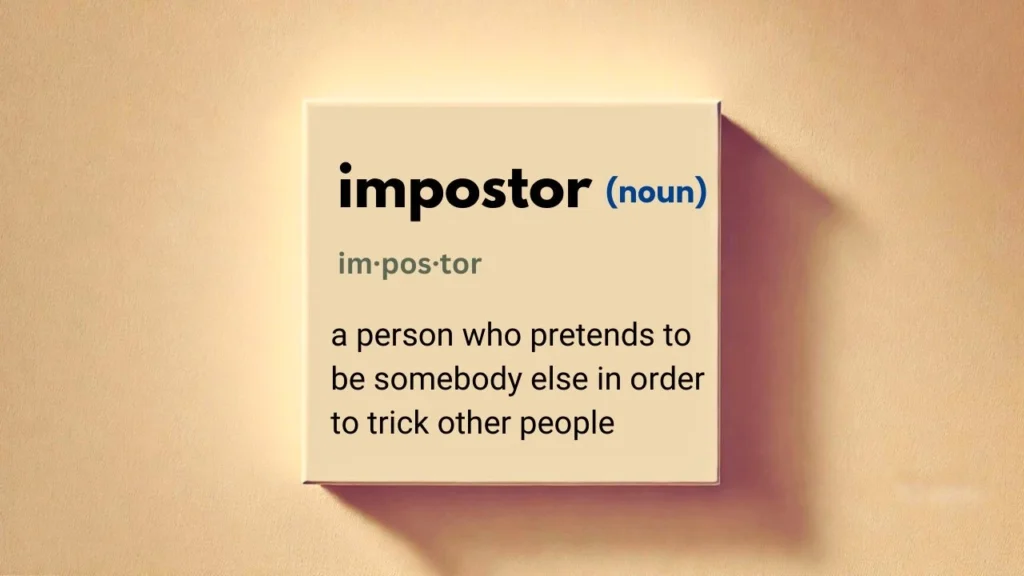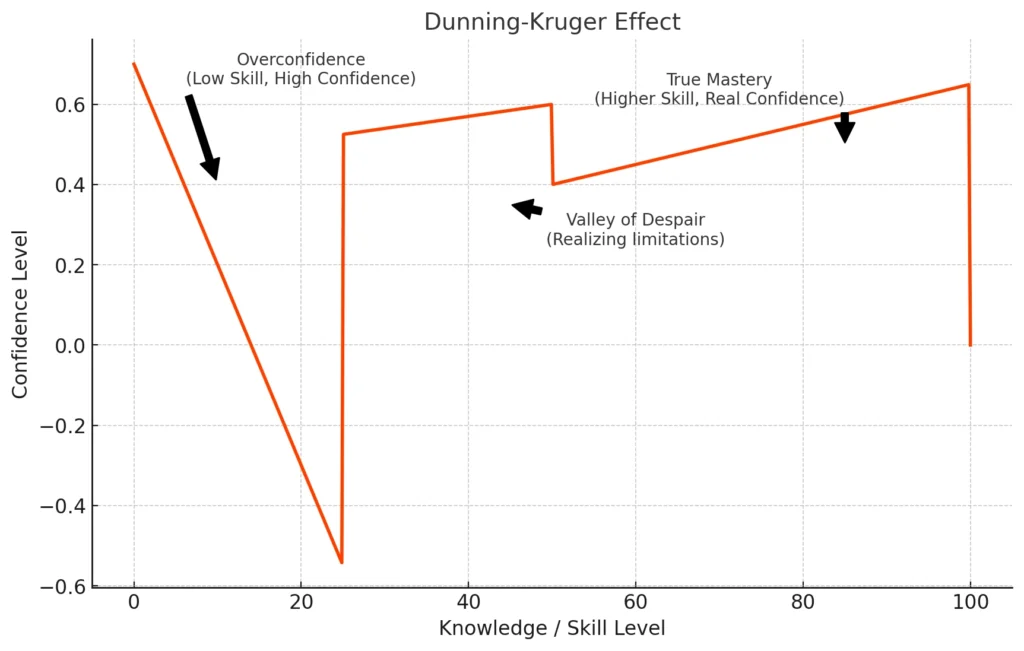Disclosure: Some of the links on this website may be affiliate links. As an Amazon Associate, we earn from qualifying purchases. The price you pay will be the same, but by using our affiliate links you are helping support our website. Learn more on our disclaimer page.
Introduction
Have you ever done well but still felt self-doubt about earning the praise? Did you feel it was just because you were lucky?
If so, then, like me, you might be dealing with something called Impostor Syndrome.
This is when people who have done well and succeeded feel like they don’t deserve their success. They worry that others will eventually “find out” that they are not as capable as they appear to be. And this fear often stops them from feeling happy, even though they truly deserve it.
In this article, we look at why impostor syndrome happens, and the ways to overcome it. But first, we will try to understand the important concept of labelling.
When Labels Lead to Self-Doubt

Does the way people see you, and think of you, sometimes seem to define your life more than it should?
When I was in high-school, I used to get really good grades, and so, everyone around labelled me as “the top of the class”. I was also very quiet, at least at school, which earned me the label “introvert.” At home, I started running errands when I was still quite young, so I was labelled a “go-getter.”
I think you would have understood what I am trying to imply. Labelling is simply a way of giving someone a name or a category, depending on what they do and how we see them act.
These labels can be helpful, but sometimes they can be harmful too, depending on how they are absorbed or accepted.
Is labelling always bad?
Not necessarily. In the right conditions, a label can also have a positive impact. It can encourage people to develop their strengths and reach their potential.
For instance, I have always considered the label of being a “go-getter,” a blessing. It helped me tremendously and shaped my professional life.
But sometimes, these labels can become a bit limiting or set unrealistic expectations, which is when problems begin to arise.
A label becomes harmful if it makes the person feel that they need to constantly live up to it. This leaves no room for making mistakes or even for growth.
So, it isn’t always the label itself, but how it shapes the self-view that can make it either good or bad for the individual.
This happens through the process of internalization. It is when we start believing these external labels and think of them as a true reflection of ourselves.
Internalization: The Hidden Cause of Self-Doubt
“Everybody is a genius. But if you judge a fish by its ability to climb a tree, it will live its whole life believing that it is stupid.”
Albert Einstein
Sometimes the labels we carry start reflecting our deepest fears and self-doubts.
When we internalize labels, they shape how we see ourselves. Whether positive or negative, these labels can make us feel that we need to live up to impossible standards. This ends up causing self-doubt especially when we don’t measure up to them.
It also puts us under a lot of self-inflicted, internal pressure. What is also interesting is that this pressure can not only come from negative labels but from positive ones too.
To make this clearer, I’ll share a personal experience.
As I mentioned earlier, as a student I was labelled as “the top of the class“. It was something very positive and pleasing for me and made my parents very proud. But soon, I started feeling the intense pressure to maintain the status.
This wasn’t a pressure that I received externally from my teachers or my parents. It was internal, something which I was placing on myself!
When I was in the 8th grade, my grades slipped that year. I remember feeling the intense fear of losing my reputation. A great deal of stress and anxiety followed. From being a very confident student, I had internalized the label into self-doubt. I even began to question my ability to succeed ever again.
When self-doubt takes hold, it can sometimes grow into something bigger, known as impostor syndrome. This often stems from the internal pressure of living up to the labels we carry, as we just discussed. It can result in feeling like a fake, or a pretender, despite previous achievements.
Impostor Syndrome – Self-Doubt & Fear of Being Exposed

People with Impostor Syndrome feel that they don’t deserve their success.
They think they are only pretending to be capable. They fear that it is only a matter of time before others find out they are not as competent as they seem.
The Trap of Perfectionism
Their self-doubt makes them believe that even a small mistake can be a threat, because that one error can show that they aren’t acceptable any longer.
This leads them to be trapped in perfectionism.
Over time, this need to be perfect can even cause them to burnout, making their anxiety and self-doubt even worse.
The Irony of Success
Success can make the fear of being exposed even stronger. The more successful they get, the more they fear losing.
With each new success, they might feel even more pressure to prove themselves. Instead of enjoying their achievements, they become more anxious about being exposed as someone they are not.
With that in mind, I think it is also important to know how we can recognize Impostor Syndrome in ourselves.
How to Recognize Impostor Syndrome in Yourself

Impostor Syndrome can often go unnoticed until it takes hold. So, how can you spot it? Start by looking for any of these signs:
- Feeling like your success is due to luck rather than your skills or effort.
- Fear of being exposed as a fraud, even though you’re capable.
- Difficulty accepting praise or success, thinking you don’t really deserve it.
- Overworking to make up for “imperfections”, believing you need to prove yourself.
Self-reflection is a helpful way to notice these feelings. But do remember that these signs can also overlap with other issues like anxiety or depression.
So, talking to a professional if you are feeling confused or worried should also help you understand what’s really going on.
Impostor syndrome often affects many high achievers. So, you are definitely not alone if you relate to any of these feelings.
Clance Impostor Phenomenon Scale (CIPS)
During my research for this article, I came across a free self-assessment tool, which can prove to be quite useful.
The Clance Impostor Phenomenon Scale (CIPS) consists of simple questions that can help you see how self-doubt might be holding you back. Taking this test can give you a clearer picture of how impostor syndrome may be impacting your life.
You can take the free assessment here.
Famous People Who Have Struggled with Impostor Syndrome

Impostor Syndrome can impact people across all areas of life. According to research done, 70% to 82% of people experience impostor syndrome at some point in their lives.
In fact, some very successful people have openly shared their experiences with impostor syndrome and feelings of self-doubt.
- Even after publishing a lot of successful books, Maya Angelou once said that she felt like a fraud. In her own words, “I have written eleven books, but each time I think, ‘Uh-oh, they’re going to find out now. I’ve run a game on everybody, and they’re going to find me out.‘”
- The Oscar-winning actor Tom Hanks has admitted to feeling like an impostor, fearing people would find out he’s not as talented as they believe.
- Michelle Obama has also spoken about her struggles with self-doubt and impostor syndrome, during her time at Princeton and as a public figure.
- Emma Watson, the famous actor and activist, often shared her feelings of not deserving her success, despite her achievements.
Proven Ways to Overcome Self-Doubt and Impostor Syndrome
“What makes you vulnerable makes you beautiful.”
Brené Brown
When we doubt ourselves, it makes us question everything. But there are many proven ways that are backed by research to help overcome self-doubt and Impostor Syndrome.
These methods provide the support, and guidance that can help us see just how capable we really are.
Here are three of them which I would like to share.
1. Your Perception of Yourself Can Be Misleading
People with impostor syndrome are usually the ones who have high skills or knowledge but still doubt themselves.

There is a concept in cognitive psychology called the Dunning-Kruger Effect. According to this concept, people who are not very good at something tend to overestimate their abilities. They think they are much better at something than they actually are.
On the other hand, people who are really good at something, underestimate themselves and think they are not good at all!
So, with the help of the Dunning-Kruger effect, we can see that our perception about ourselves is often misleading.
If you feel that you don’t deserve your success or think you are not good enough, it might actually mean you are better than you think!
In fact, feeling this kind of self-doubt is normal for people who are skilled.
Once you understand that these feelings are common, you can start to believe in yourself more and see how talented you really are.
Think about it!
2. Turn Impostor Syndrome into Motivation
Why let the impostor syndrome hold you back? Instead of working against it, how about using it to push ourselves to put focused, meaningful effort?
As per the findings of research done by Basima Tewfik, using the feelings of impostor syndrome as motivation, can have positive effects when done the right way.
The research shows that people with impostor syndrome can actually perform better in social settings because their self-doubt pushes them to be more empathetic, attentive, and detail-oriented in their interactions.
You can use this to your advantage to become more open to connecting with others. You can be a better listener or team player. This will help improve your performance and your confidence.
When handled in a balanced way, it encourages a growth mindset. By reframing the feelings and turning them into motivation, you can become a better performer.
3. Use Distanced & Positive Self-Talk to Your Advantage
Research has shown that using your name instead of “I”, when talking to yourself, can help you see things more clearly. It can even help in reducing stress and self-doubt. This method allows you to think things through better, almost like you are giving advice to a friend, rather than being caught up in your own feelings. This technique is known as distanced self-talk.
Now, combine the distanced self-talk with self-compassion, and you have a powerful tool to overcome self-doubt and Impostor Syndrome.
For example, when I hear my inner thoughts saying, “I don’t deserve this success,” I immediately recognize it, pause and reflect. I then change the narration to something like, “Gaurav is feeling a bit overwhelmed right now, but he has worked really hard to get here. He deserves all the success he gets!”
This way I combine positive self-talk and self-compassion. Not only does it help me stop beating myself up, but it also uplifts me when I need it most.
Give it a try! You too will notice a positive change in the way you feel!
Suggested Reading
Here are some interesting and insightful articles and books that I came across while doing the research for this blog post.
They are highly recommended to deepen your understanding of the concepts discussed in this blog.
Research Articles
- Impostor Syndrome and Its Surprising Upside | MIT Sloan
- Unskilled and unaware of it: How difficulties in recognizing one’s own incompetence lead to inflated self-assessments. (apa.org)
- Distanced self-talk increases rational self-interest – PMC (nih.gov)
- Dr. Pauline Rose Clance – IMPOSTOR PHENOMENON
Conclusion
In wrapping up, all of us have to face self-doubt at some point in our lives. However, it need not slow down our progress.
In this article, we looked at the concept of labelling and how it can lead to self-doubt and impostor syndrome. We also looked at how self-perception can be misleading, and using self-reflection and positive self-talk can help overcome it.
Don’t forget, you’ve worked hard to be where you are. By turning self-doubt into motivation, try to move forward with confidence. Always believe in yourself.
Let me share this beautiful quote by A.A. Milne, the author of the Winnie the Pooh series, which always brings me a sense of hope.
“You are braver than you believe, stronger than you seem, and smarter than you think.”
How do you deal with impostor syndrome? Share your thoughts or experiences in the comments below. I would love to hear them!
With that, I will wrap up this post and look forward to seeing you soon in another one!
Stay connected!
Frequently Asked Questions (FAQ’s)
- Micro-Habits: How Small Changes Lead to Big Results - October 19, 2024
- Self-Doubt: How Impostor Syndrome Silently Steals Confidence - September 19, 2024
- Responding vs. Reacting: 4 Zen Lessons from the Poisonous Arrow - August 19, 2024




